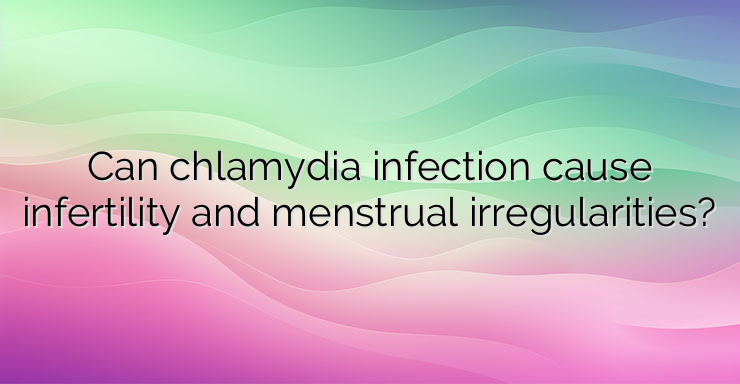Chlamydia is among the most common sexually transmitted bacterial infections caused by Chlamydia trachomatis. They usually affect people at a young age, and if timely treatment is not carried out, the infection can cause serious complications. The course of chlamydial sexually transmitted infections is very diverse and atypical. The relatively long incubation period (from about one to two weeks, rarely up to one month) and asymptomatic carriage are the reason for the large number of (undetected) infections. Despite sometimes the lack of specific clinical manifestations, these infections in women can affect all parts of the genital tract and cause severe and irreparable changes to it. The infection can be asymptomatic, acute or chronic and cause salpingitis (inflammation of the fallopian tubes), cervicitis (inflammation and changes in the epithelium of the cervix), endometritis (inflammation of the lining of the uterus), pelvic inflammatory disease… In addition to sex organs, in some cases the eyes, joints, liver and lungs are also affected. What are the most common symptoms? Increased amount of vaginal discharge with or without varying degrees of itching, burning and pain during intercourse (dyspareunia); The appearance of scanty genital bleeding and muco-purulent secretions is possible; Constant moderate pain in the lower abdomen, more often unilaterally, but also bilaterally, accompanied by general weakness, fever, back pain; In a significant number of patients, the temperature and blood parameters are normal and there is no evidence of an inflammatory process; Disorders in the menstrual cycle (irregular periods). What can be the complications of untreated chlamydia? The transition to the upper parts of the genital tract and the chronic and asymptomatic development of the infection leads to the formation of adhesions and sterility. Chlamydia trachomatis has a marked affinity for parasitizing in the hairs of the fallopian tubes, as a result of which they become rigid and immobile, and the resulting adhesions in the lumen of the tubes lead to their blockage and, accordingly, the impossibility of pregnancy. An increased risk of miscarriage, infection of the amniotic sac and amniotic fluid, rupture of the amniotic membranes, and premature birth has been reported in pregnant women with chlamydia. Can the infection be transmitted to the newborn? An infected and untreated mother can transmit the infection to the newborn child during the delivery period, in which conjunctivitis with purulent discharge (unilateral, between 4 and 14 days after birth), nasopharyngitis and/or interstitial pneumonia (appears in the first 1- 3 months after birth). The infection resolves after treatment with an antibiotic prescribed by a neonatologist. Basically, in the interest of the health of the newborn, but also of the mother, it is recommended that pregnant women with an active genital infection give birth by cesarean section. Due to the asymptomatic course of some of the infections with minimal suspicion of such, timely examinations and adequate treatment should be carried out,as well as follow-up studies after treatment. How does it manifest itself in men? Urethritis – frequent urination, sometimes accompanied by mucous-purulent not abundant painful secretion; Morning manifestations of glassy discharge from the urethra, and the first urine may be cloudy; Slight pain and itching in the urethra; Prostatitis – itching and burning during urination, heaviness in the pelvic area, blood in the urine or during ejaculation. The surest way to find out if the infection is chlamydial is by conducting laboratory tests: A discharge is taken from the vagina, the cervix of a woman or from the penis of a man – urethral discharge or ejaculate – and sent to a laboratory where tests are carried out to establish the type of bacteria by sowing in specialized media; Search for bacteria in urine; Testing serum concentrations of antibodies (IgG, IgM and IgA) directed against chlamydia; PSR diagnosis (best in the early stages of the disease, when the antigen can still be isolated from the cervical and urethral canals). The control examination is carried out on the second and fourth week after the end of the therapy with the same test with which the diagnosis was made. What is the treatment? Difficult and in some cases prolonged. It is mainly carried out with tetracycline and macrolide antibiotics in different doses and a period of 7 to 14 days depending on the severity and course. Like other sexually transmitted diseases, the simultaneous treatment of the partner is necessary to achieve the maximum therapeutic effect. Prevention is important, namely, abstinence from casual sexual contact and the correct use of condoms.It is mainly carried out with tetracycline and macrolide antibiotics in different doses and a period of 7 to 14 days depending on the severity and course. Like other sexually transmitted diseases, the simultaneous treatment of the partner is necessary to achieve the maximum therapeutic effect. Prevention is important, namely, abstinence from casual sexual contacts and the correct use of condoms.It is mainly carried out with tetracycline and macrolide antibiotics in different doses and a period of 7 to 14 days depending on the severity and course. Like other sexually transmitted diseases, the simultaneous treatment of the partner is necessary to achieve the maximum therapeutic effect. Prevention is important, namely, abstinence from casual sexual contact and the correct use of condoms.


Leave a Reply